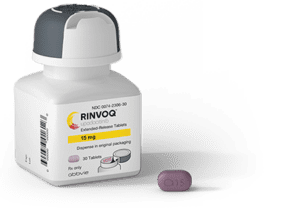 FDA has approved Rinvoq (upadacitinib) from AbbVie (NYSE:ABBV) to treat moderate to severe atopic dermatitis in individuals at least 12 years old.
FDA has approved Rinvoq (upadacitinib) from AbbVie (NYSE:ABBV) to treat moderate to severe atopic dermatitis in individuals at least 12 years old.
AbbVie anticipates 2025 risk-adjusted sales for Rinvoq to top $7.5 billion.
The most common type of eczema, atopic dermatitis, can be managed with various therapies, including corticosteroids, topical calcineurin inhibitors and immunosuppressants. Nevertheless, the disease can be persistent.
In 2017, FDA approved the first biologic for moderate to severe atopic dermatitis, Dupixent (dupilumab), from Regeneron Pharmaceuticals (NSDQ:REGN).
The new indication for the Janus kinase (JAK) inhibitor Rinvoq is constrained to individuals whose dermatitis has not responded to prior therapy. Alternatively, patients for whom such dermatitis therapies are not recommended are also eligible for Rinvoq.

Image courtesy of AbbVie.
“This additional approval for Rinvoq provides a once-daily oral option that can significantly improve the debilitating itch and skin symptoms of atopic dermatitis,” said Dr. Thomas Hudson, senior vice president, research and development, chief scientific officer of AbbVie.
ABBV shares were up 1.36% to $135.34 in afternoon trading.
To win the new indication, AbbVie provided data from three Phase 3 studies focused on atopic dermatitis. The data indicated that Rinvoq recipients had a significant improvement in itching (pruritus) as early as the first week compared to placebo.
In early December, AbbVie updated the prescribing information for Rinvoq following discussions with the FDA to describe the increased risk in patients 50 and older with a heightened risk for cardiovascular disease.
FDA recommended the labeling updates for JAK inhibitors at large after announcing that it had observed an increased risk of serious adverse events in some patients taking the JAK inhibitor Xeljanz and Xeljanz XR (tofacitinib) from Pfizer (NYSE: PFE).
FDA first approved Rinvoq for moderate to severe rheumatoid arthritis in 2019. An indication for active psoriatic arthritis followed in December 2021.
Filed Under: clinical trials, Dermatology, Drug Discovery





Tell Us What You Think!
You must be logged in to post a comment.